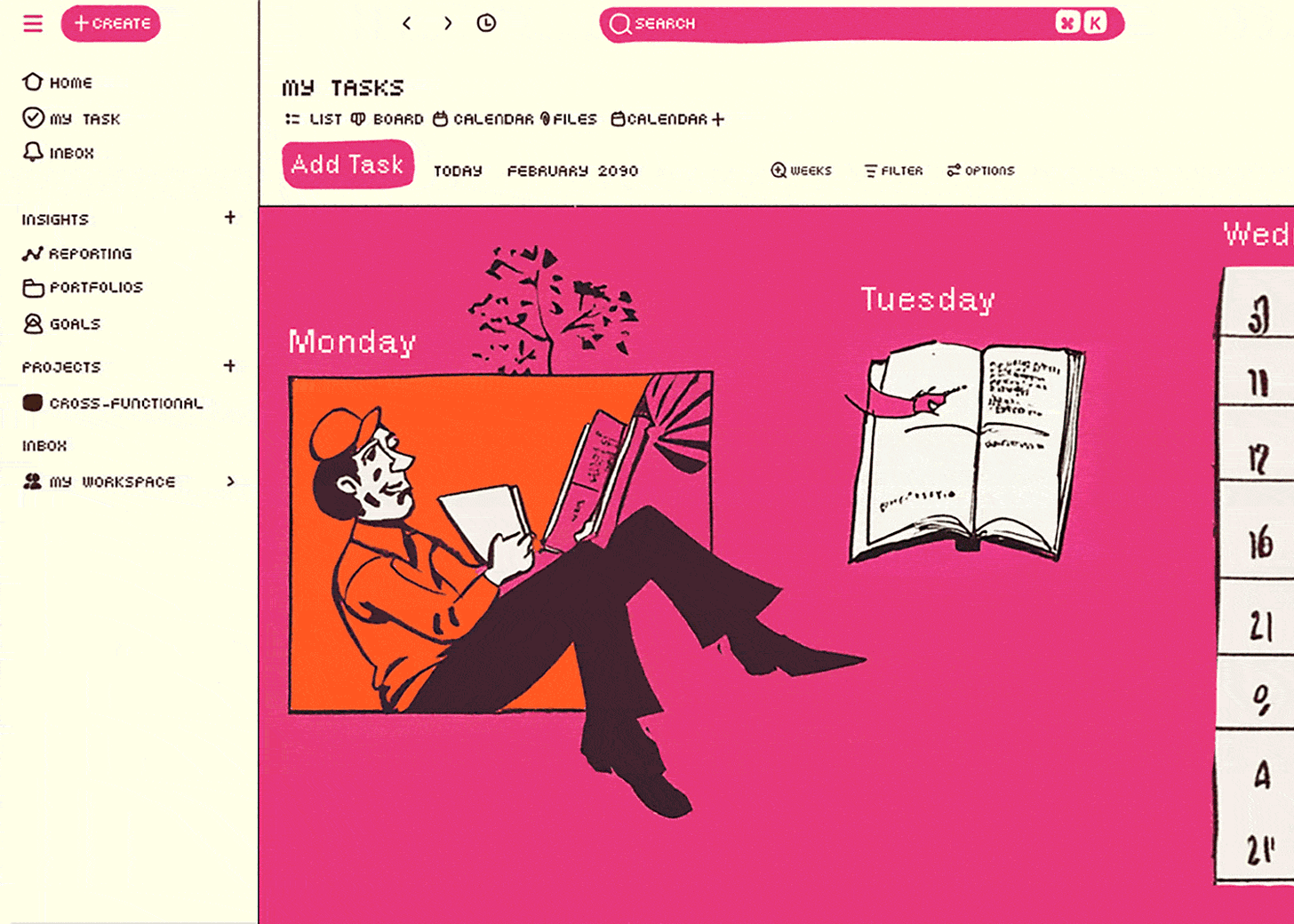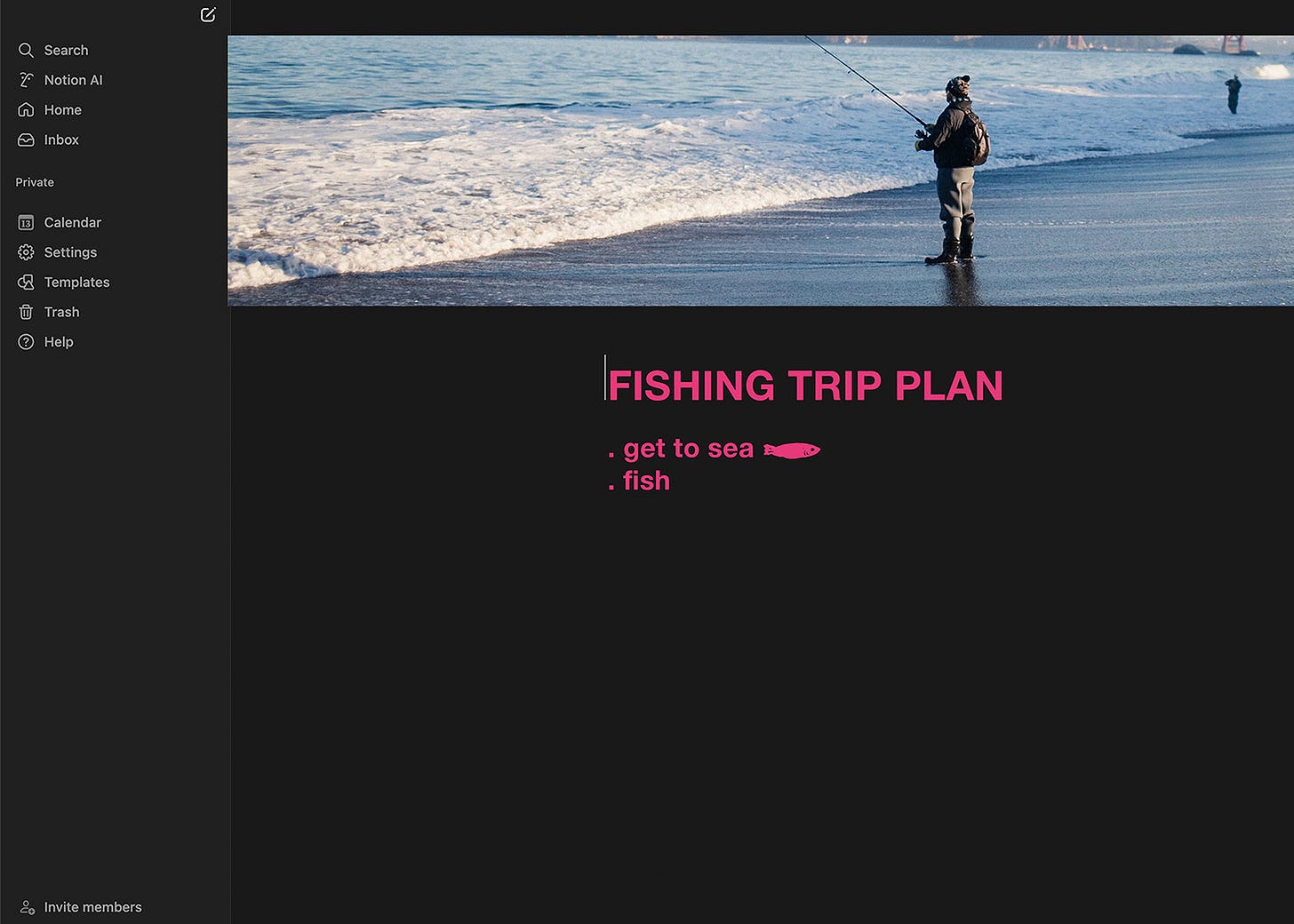Life's a project
Instead of disconnecting, users are embracing workplace tools in their personal lives
I started to pay attention once my friend told me she was using Notion to run and organise her business. Not only that, but many other aspects of her life – journaling, recipe lists, calendar appointments – now all live inside of Notion. This was the beginning of last year, and it was not long before I transferred every iPhone note and Evernote page into the platform myself.
Productivity tools have been everywhere in the last few years, sprouting up like Hydra heads. The features can sometimes be rather complicated, which is why some have argued that these digital organisers make us less productive in the end, since the maintenance required can sometimes outstrip the benefits. Granted, these tools can be technically tricky. But when crafted well, these digital workspaces can be effective planners or “second brains”.
The other week, I went to a Notion meetup in central London – the first event which was structured as a collaborative workshop. We were told to bring our computers along with any questions on Notion functionality. In hindsight, I entered the evening with a naïve amount of confidence. My Notion was neat and organised, I thought, but I would soon meet people with accounts that made mine look like a toddler had assembled it, then handed it off to another toddler to ruin. Not only were these databases (Notion speak for tables, or digital notebooks) more sophisticated, but the other attendees used the platform for many different tasks that I had not even considered. One guy had an entire audience for the demo of his platform, which he calls his Life OS.
For today’s piece from the DF archives, Tasmin Lockwood investigates how people are using tools like Notion, Trello and other organisation tools to plan and record every inch of their lives – from hobbies to marriage proposals. Read the piece below to discover more, but this creative use of the software was similar to the main takeaway from the above event. Originally I thought Notion, or any other similar application, was just a digital notebook. Viewed broadly, though, life can be seen as a series of projects, and Notion is a stellar project management system with the flexibility to help with all of them.
The most sophisticated Notion users I encountered that evening had internalised the following concept: Every goal we set, from learning a new language to planning a holiday, follows similar patterns of organisation and tracking. They were not just storing information in a container, they were the architect of personal systems. Their databases were dynamic frameworks that evolved with their own tasks, turning the concept of life management into something tangible and actionable.
What do you use Notion for? You can always let me know: jonathan@digitalfrontier.com
(Originally published: February 14 2025)
By: Tasmin Lockwood [@journotas]
IT’S NOT UNUSUAL for singles to turn to apps to find love today, but digital organiser Notion is not typically the first one that comes to mind.
But some have taken to Notion as an alternative to swiping by creating lengthy “date me” documents – akin to a personal CV – including information that goes well beyond age, height and location.
San Franscisco-based techie Connie Li, for example, describes herself as “short, monogamous and usually dressed in an alarmingly varied array of colours”. She’s a lover of cosy things – “bookshops with that old-book smell and perky plants” – who will “absolutely get hype for the periodic rave”. She also speaks Mandarin and has “decent meme game”, per her date-me doc.
Notion’s new use as a place to search for soulmates speaks to how we’re increasingly using work tools in our personal lives – and that’s only intensifying thanks to our obsession with AI and efficiency.
“A lot of people are turning to tech to manage the chaos of their lives,” Lexie Barnhorn, who heads up social media and influencer marketing at Notion, tells Digital Frontier, “and it shows that people are finding good use cases in their work life that they feel they can replicate in their personal life.”
“That’s why a lot of people are switching to tools like Notion versus just trying to manage everything in a Quick Notes app,” she adds.
Obsession trackers
Indeed, LA-based PR professional Sarah, whose name has been changed to keep her identity private, started using Notion when she was working with a startup that had a subscription. But it gradually became a place for her to track personal story ideas, volunteer work and her anime consumption.
“I’ve always loved anime. I speak Japanese, so I’ve watched an unhealthy amount of anime in my lifetime,” she tells Digital Frontier, “at some point I was like, okay, my memory’s so bad that I don't really remember what I liked about this anime [...] I didn’t know much about the genres and the studios behind it. I felt like my knowledge was so superficial for someone who had been so into this for years.”
Sarah built a spreadsheet to manage her obsession. It includes columns for the title, number of seasons, what she loves about that anime, the studio that made it, whether it’s still being made, a summary and personal rating; she currently has 61 entries. While apps for this already exist, such as Letterboxd or Goodreads for books, they can feel quasi-social media and “performative”; Notion is personal, just for her, she says.
Technology serves as a digital archive – and it’s becoming a part of our memory. People use Notion as their “second brain”, Barnhorn says. When used as a journal or diary or to track hobbies, sports or TV, Notion’s built-in AI can tell users who they went out to lunch with in April last year, how they felt in certain situations or the date that they last went for a run.
To sever or not to sever
In Apple TV’s hit show “Severance”, employees at a big corporation split – or sever – their professional and personal minds so that the “innie” (in-work self) and “outie” (outside self) can’t remember what happened to the other one.
At first, it seems an alluring way to optimise work-life balance. The fictional technology is an extreme example, but it echoes workers’ real-world efforts to switch off outside of working hours in an increasingly connected world. Most workplace messaging tools like Slack now offer the ability to pause notifications at certain times and mark yourself offline. Some countries have even codified it into law, with workers given the “right to disconnect”.
Users letting work tools seep into their personal lives may seem to be bucking that trend, but many still prefer to keep boundaries in place between the two. This helps to prevent life from getting “messy” and ensures the right people have access to the right information, says Hannah Baynham, the co-founder of fintech startup Haboo Money, which helps people get out of debt. Baynham is a self-proclaimed “Trello-head” and uses the organisational tool throughout her work and personal life, but doesn't want colleagues to see her personal tasks, and vice versa.
“My work one is shared with my co-founder, my home one is shared with my partner and then I have a personal one that is just for me. And so, obviously, they don’t need to see each other’s,” she says.
Moving house is one of the most stressful things that you can do, but when Baynham landed in a new and unfurnished flat last year, she felt in control of the situation.
When we spoke, her mood was in stark contrast to London, the chaotic city she and her partner were returning to after travelling Europe for three months. That’s, she says, because she used team management platform Trello to project manage her move. She actually uses it to organise all the details of her everyday life.
“It’s so easy to get overwhelmed,” Baynham says. “Then you’ve set yourself up to spiral.”
Baynham organises all of her tasks into categories and spread across three boards, depending on whether they are personal, with her partner or to do with her company: “Do Later”, “Do Next”, “Doing” and “Done”, each based on priority and timing, or whether she is waiting on someone else before she can tick it off. For the move, immediate needs like a bed and sofa took priority over less urgent tasks like finding a dining table.
But having everything in one place can bring additional peace of mind and make life easier to manage: say goodbye to two calendars and two to-do lists. Now, several startups see an opportunity in creating tools that are specifically designed for those users who want to handle their work and personal lives in the same place.
Use your words
Hinged on new developments in voice tech and AI, the likes of Bee, Omi AI and Plaud AI are vying to close the gap between personal and professional productivity by recording the day-to-day.
AI audio tools to record work meetings have been the norm for some time but direct-to-consumer startups are pushing boundaries on what technology we let into our living rooms.
Jonathan Mendoza, founding engineer at Granola, recently delighted fans of the note-taking app by sharing its summary of his marriage proposal to his girlfriend, including highlights of his speech and a note of his partner’s response (she said “yes”).
Some companies are leaning into the possibilities for automated notes to play such an intimate role in everyday life. Plaud AI, which touts itself as a personalised note-taking solution, even has a Valentine’s Day campaign: “Share love, save memories” it reads.
A conversational interface does make it easy to quickly capture thoughts and tasks but poses big questions around privacy and voice data. Not everyone is open to being recorded – but they likely won’t have a choice. At least that’s what an investor at impact fund Eka Ventures wrote on LinkedIn after trialing an AI-driven wearable for 10 days. “Even if you decide not to wear a recording device, someone else in your circle may decide to do so. We should start thinking through the consequences of recording and consent within this,” she wrote.
But it doesn’t have to be recording everything, everywhere, all at once. “To me, the real value to us as individuals is the self-reflective part of the process,” Lachlan Chavasse, the co-founder of voice-powered journalling agent Daily, tells Digital Frontier.
Long-term, Chavasse plans is to provide insights and predictions based on data from past experiences to help with decision making. That means, in the future, an AI agent could suggest that you get outside more, quit your job or nudge you to drop the big question to your partner – and hopefully save you from using that date-me doc again.
Over at Notion, in its San Franscisco HQ, the team recently celebrated Connie’s engagement, Barnhorn tells me. Her date-me doc is now headed with an announcement: “As of Nov 2024 – this is now deprecated! 😍 I am now happily engaged 💍 (and yes, we did meet through our date-me docs 😜)”.



